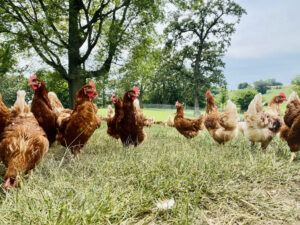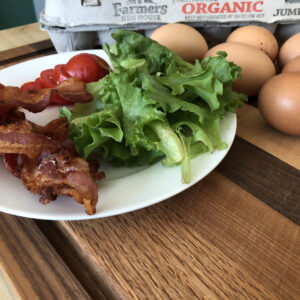
While certified organic eggs have been around since the 1990s, much of the public still doesn’t exactly understand what it means that something is certified organic? Organic eggs are no different.
Additionally, when you’re a company that offers a variety of products like we do (see below), it’s important to be as clear and transparent as possible to prevent any confusion at the egg shelf. It can be confusing trying to discern all the claims and labels, when all you’re looking for is a good egg (pun intended!).

Non-organic Free Range Eggs (green label);

Organic Free Range Eggs (orange label)

Pasture Raised Organic Eggs (light green label)
That’s why we’re providing an easy Top 5 facts about what it means for eggs to be certified organic. Hopefully, this help provide some clarity next time you’re trying to decide between what Farmers Hen House eggs to purchase.

Top 5 Facts About Organic Eggs
Hens are fed a diet made up entirely of organic feed (without pesticides).
- In fact, the farm on which they’re raised also has to be certified organic not just in the feed they provide for the hens, but in all aspects of the farm, whether other crops and/or livestock.
Hens must be cage-free.
- Hens cannot be kept in cages, and must have outdoor access. This goes hand in hand with our Free-Range and Pasture-Raised eggs. This is also why we’re Certified Humane.
Farm must be certified by an organic certifying agent.
- We are certified through MOSA.
Certified organic eggs will always carry a ‘USDA Organic‘ seal.
- This seal is never duplicated and provides the utmost assurance that your eggs are organic.
Organic Eggs are healthier and taste better!
- Organic eggs have richer yolks and harder shells, which provide a taste that most people prefer.
- Organic feed, in addition to the outdoor access, provides a rich variety of diverse food options (flowers, bugs, plants, etc.) for organic hens, producing organic eggs that are packed with more micronutrients and taste richer.

